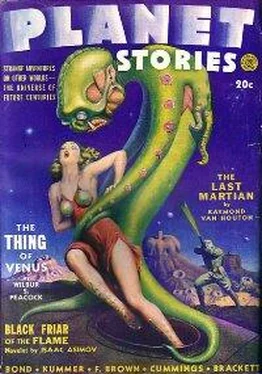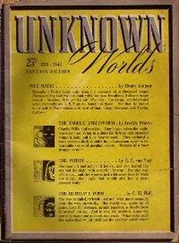Fredric Brown - The Star Mouse
Здесь есть возможность читать онлайн «Fredric Brown - The Star Mouse» весь текст электронной книги совершенно бесплатно (целиком полную версию без сокращений). В некоторых случаях можно слушать аудио, скачать через торрент в формате fb2 и присутствует краткое содержание. Город: New York, Год выпуска: 1942, Издательство: Love Romances, Inc., Жанр: Юмористическая фантастика, на английском языке. Описание произведения, (предисловие) а так же отзывы посетителей доступны на портале библиотеки ЛибКат.
- Название:The Star Mouse
- Автор:
- Издательство:Love Romances, Inc.
- Жанр:
- Год:1942
- Город:New York
- ISBN:нет данных
- Рейтинг книги:3 / 5. Голосов: 1
-
Избранное:Добавить в избранное
- Отзывы:
-
Ваша оценка:
- 60
- 1
- 2
- 3
- 4
- 5
The Star Mouse: краткое содержание, описание и аннотация
Предлагаем к чтению аннотацию, описание, краткое содержание или предисловие (зависит от того, что написал сам автор книги «The Star Mouse»). Если вы не нашли необходимую информацию о книге — напишите в комментариях, мы постараемся отыскать её.
The Star Mouse — читать онлайн бесплатно полную книгу (весь текст) целиком
Ниже представлен текст книги, разбитый по страницам. Система сохранения места последней прочитанной страницы, позволяет с удобством читать онлайн бесплатно книгу «The Star Mouse», без необходимости каждый раз заново искать на чём Вы остановились. Поставьте закладку, и сможете в любой момент перейти на страницу, на которой закончили чтение.
Интервал:
Закладка:
The Star Mouse
by Fredric Brown
Mitkey, the Mouse, wasn’t Mitkey then.
He was just another mouse, who lived behind the floorboards and plaster of the house of the great Herr Professor Oberburger, formerly of Vienna and Heidelberg; then a refugee from the excessive admiration of the more powerful of his fellow-countrymen. The excessive admiration had concerned, not Herr Oberburger himself, but a certain gas which had been a by-product of an unsuccessful rocket fuel-which might have been a highly successful something else.
If, of course, the Professor had given them the correct formula. Which he—Well, anyway, the Professor had made good his escape and now lived in a house in Connecticut. And so did Mitkey.
A small gray mouse, and a small gray man. Nothing unusual about either of them. Particularly there was nothing unusual about Mitkey; he had a family and he liked cheese and if there were Rotarians among mice, he would have been a Rotarian.
The Herr Professor, of course, had his mild eccentricities. A confirmed bachelor, he had no one to talk to except himself, but he considered himself an excellent conversationalist and held constant verbal communion with himself while he worked. That fact, it turned out later, was important, because Mitkey had excellent ears and heard those night-long soliloquies. He didn’t understand them, of course. If he thought about them at all, he merely thought of the Professor as a large and noisy super-mouse who squeaked over-much.
“Und now,” he would say to himself, “ve vill see vether this eggshaust tube vas broberly machined. It should fidt vithin vun vun-hundredth thousandth of an indtch. Ahhh, it iss berfect. Und now—”
Night after night, day after day, month after month. The gleaming thing grew, and the gleam in Herr Oberburger’s eyes grew apace.
It was about three and a half feet long, with weirdly shaped vanes, and it rested on a temporary framework on a table in the center of the room that served the Herr Professor for all purposes. The house in which he and Mitkey lived was a four room structure, but the Professor hadn’t yet found it out, seemingly. Originally, he had planned to use the big room as a laboratory only, but he found it more convenient to sleep on a cot in one corner of it, when he slept at all, and to do the little cooking he did over the same gas burner over which he melted down golden grains of TNT into a dangerous soup which he salted and peppered with strange condiments, but did not eat.
“Und now I shall bour it into tubes, and see vether vun tube adjacendt to another eggsplodes der secondt tube vhen der virst tube iss—”
That was the night Mitkey almost decided to move himself and his family to a more stable abode, one that did not rock and sway and try to turn handsprings on its foundations. But Mitkey didn’t move after all, because there were compensations. New mouse-holes all over, and—joy of joy!—a big crack in the back of the refrigerator where the Professor kept, among other things, food.
Of course the tubes had been not larger than capillary size, or the house would not have remained around the mouseholes. And of course Mitkey could not guess what was coming nor understand the Herr Professor’s brand of English (nor any other brand of English, for that matter) or he would not have let even a crack in the refrigerator tempt him.
The Professor was jubilant that morning.
“Der fuel, idt vorks! Der secondt tube, idt did not eggsplode.Und der virst, in seggtions, as I had eggspectedt! Und it is more bowerful; there will be blenty of room for der combartment—”
Ah, yes, the compartment. That was where Mitkey came in, although even the Professor didn’t know it yet. In fact the Professor didn’t even know that Mitkey existed.
“Und now,” he was saying to his favourite listener, “idt is budt a madter of combining der fuel tubes so they work in obbosite bairs. Und then—”
That was the moment when the Herr Professor’s eyes first fell on Mitkey. Rather, they fell upon a pair of gray whiskers and a black, shiny little nose protruding from a hole in the baseboards.
“Veil!” he said, “vot haff ve here! Mitkey Mouse himself! Mitkey, how would you like to go for a ride, negst veek? Ve shall see.”
That is how it came about that the next time the Professor sent into town for supplies, his order included a mousetrap—not one of the vicious kind that kills, but one of the wire-cage kind. And it had not been set, with cheese, for more than ten minutes before Mitkey’s sharp little nose had smelled out that cheese and he had followed his nose into captivity.
Not, however, an unpleasant captivity. Mitkey was an honored guest. The cage reposed now on the table at which the Professor did most of his work, and cheese in indigestion-giving abundance was pushed through the bars, and the Professor didn’t talk to himself any more.
“You see, Mitkey, I vas going to sendt to der laboratory in Hardtfordt for a vhite mouse, budt vhy should I, mit you here? I am sure you are more soundt and healthy and able to vithstand a long chourney than those laboratory mices. No? Ah, you viggle your viskers and that means yes, no? Und being used to living in dargk holes, you should suffer less than they from glaustrophobia, no?”
And Mitkey grew fat and happy and forgot all about trying to get out of the cage. I fear that he even forgot about the family he had abandoned, but he knew, if he knew anything, that he need not worry about them in the slightest. At least not until and unless the Professor discovered and repaired the hole in the refrigerator. And the Professor’s mind was most emphatically not on refrigeration.
“Und so, Mitkey, ve shall place this vane so—it iss only of assistance in der landing, in an atmosphere. It and these vill bring you down safely and slowly enough that der shock-absorbers in der movable combartment vill keep you from bumping your head too hard, I think.” Of course, Mitkey missed the ominous note to that “I think” qualification because he missed all the rest of it. He did not, as has been explained, speak English. Not then.
But Herr Oberburger talked to him just the same. He showed him pictures. “Did you effer see der Mouse you vas named after, Mitkey? Vhat? No? Loogk, this is der original Mitkey Mouse, by Valt Dissney. Budt I think you are cuter, Mitkey.”
Probably the Professor was a bit crazy to talk that way to a little gray mouse. In fact, he must have been crazy to make a rocket that worked. For the odd thing was that the Herr Professor was not really an inventor. There was, as he carefully explained to Mitkey, not one single thing about that rocket that was new. The Herr Professor was a technician; he could take other people’s ideas and make them work. His only real invention—the rocket fuel that wasn’t one—had been turned over to the United States Government and had proved to be something already known and discarded because it was too expensive for practical use.
As he explained very carefully to Mitkey, “It iss burely a matter of absolute accuracy and mathematical correctness, Mitkey. Idt iss all here—ve merely combine—und ve achieff vhat, Mitkey?
“Eggscape velocity, Mitkey! Chust barely, it adds up to eggscape velocity. Maybe. There are yet unknown facgtors, Mitkey, in der ubper atmosphere, der troposphere, der stratosphere. Ve think ve know eggsactly how mudch air there iss to calculate resistance against, but are ve absolutely sure? No, Mitkey, ve are not. Ve haff not been there. Und der marchin iss so narrow that so mudch as an air current might affect idt.”
But Mitkey cared not a whit. In the shadow of the tapering aluminum-alloy cylinder he waxed fat and happy.
“Der tag, Mitkey, der tag! Und I shall not lie to you, Mitkey. I shall not giff you valse assurances. You go on a dancherous chourney, mein little friendt.
Читать дальшеИнтервал:
Закладка:
Похожие книги на «The Star Mouse»
Представляем Вашему вниманию похожие книги на «The Star Mouse» списком для выбора. Мы отобрали схожую по названию и смыслу литературу в надежде предоставить читателям больше вариантов отыскать новые, интересные, ещё непрочитанные произведения.
Обсуждение, отзывы о книге «The Star Mouse» и просто собственные мнения читателей. Оставьте ваши комментарии, напишите, что Вы думаете о произведении, его смысле или главных героях. Укажите что конкретно понравилось, а что нет, и почему Вы так считаете.












